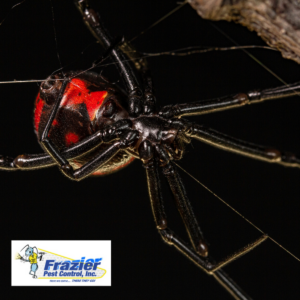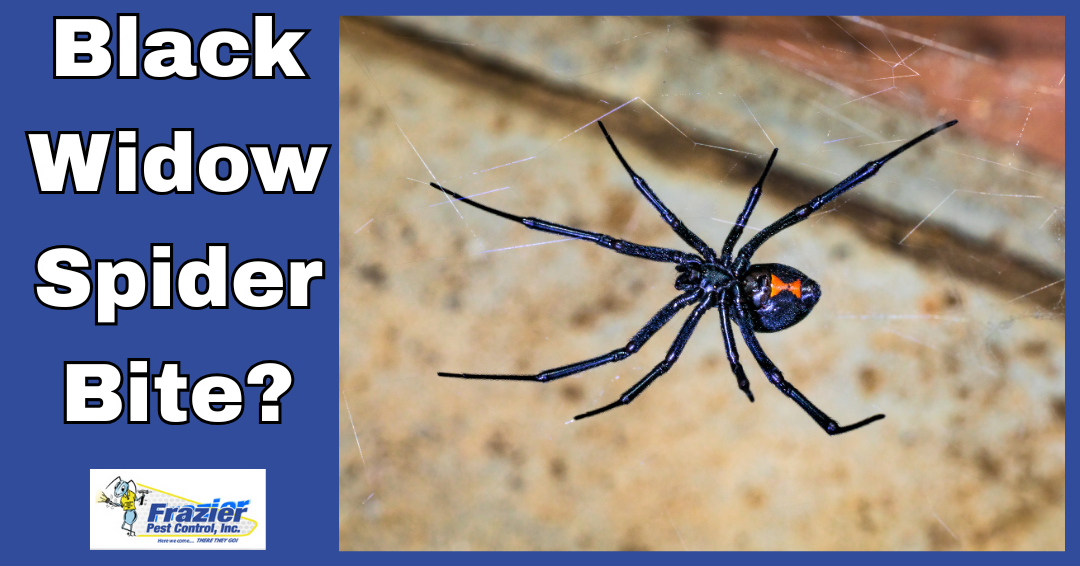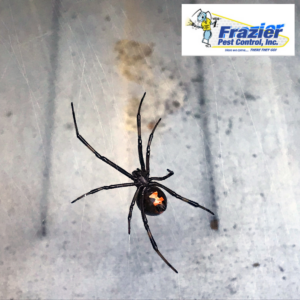What Are the Symptoms of a Black Widow Spider Bite?
A black widow spider bite is more than just a painful nuisance—it can be a serious medical concern if left untreated. These notorious spiders are known for their shiny black bodies and signature red hourglass marking, but it’s their venom that truly sets them apart. Black widow venom is considered 15 times more potent than a rattlesnake’s, yet human fatalities are rare thanks to medical advancements. Still, knowing the symptoms of a black widow spider bite can help you respond quickly and reduce the risk of complications.
Read more: Insects in Palm Springs, CA: What You Need to Know
At Frazier Pest Control, we believe that education is the first line of defense. By learning to recognize the signs of a black widow bite, you can protect yourself, your family, and your peace of mind.
The Initial Bite: What It Feels Like
The bite of a black widow spider may go unnoticed at first. Many people report feeling only a slight pinprick or mild stinging sensation when the bite occurs. Within 30 to 60 minutes, however, symptoms can escalate quickly.
 Early signs may include:
Early signs may include:
- Localized pain that increases in intensity
- Redness and swelling around the bite
- Two small puncture marks where the fangs entered the skin
This early reaction might not seem alarming, but it can progress into more severe symptoms, especially in children, elderly adults, or individuals with compromised immune systems.
What the Bite Looks Like (and what it’s not)
Black widow bites may show two tiny puncture marks, localized redness, and swelling. Within 30–60 minutes, pain typically increases and can radiate to the back, chest, or abdomen. Unlike brown recluse bites, tissue necrosis is uncommon with black widows. If a lesion rapidly ulcerates or blackens, seek medical care to rule out other causes (including bacterial infection) rather than assuming “spider bite.”
Read more: Mice in Coachella Valley Homes: Signs, Risks, and Removal
Progressing Symptoms: What Happens Next
As the venom spreads through the body, it affects the nervous system. This is when more serious symptoms can appear, including:
- Severe muscle cramps or spasms, often starting near the bite and radiating outward
- Abdominal rigidity or pain that mimics appendicitis
- Nausea and vomiting
- Excessive sweating
- Tremors or restlessness
- Headache or dizziness
- Elevated blood pressure
In rare and severe cases, people may also experience:
- Chest pain
- Difficulty breathing
- Temporary paralysis of the diaphragm
If any of these symptoms appear, immediate medical attention is critical. While black widow bites are rarely fatal, they can cause serious health issues without proper care.
Why Symptoms Happen
Black widow venom can trigger latrodectism—a chain reaction at nerve endings that causes a surge of neurotransmitters. The result is intense muscle pain/cramping, sweating, headache, nausea, and sometimes elevated blood pressure. Most healthy adults recover with supportive care in 1–3 days, though fatigue or aches can linger briefly.
Read more: Identify Desert Harvester Ants in Coachella Valley Homes!
Who Is Most at Risk?
Although healthy adults typically recover with minimal complications, certain individuals are at a higher risk of severe reactions:
- Young children
- Elderly individuals
- People with existing health conditions, such as heart or respiratory issues
- Those who are allergic or sensitive to insect bites and stings
If you or someone you know falls into any of these categories and is bitten, don’t wait. Seek emergency medical help right away.
Children & Pets: Special Guidance
Children: escalate faster due to body size. If a child has a suspected bite plus cramps, vomiting, lethargy, or breathing trouble, go to the ER.
Pets (dogs/cats): watch for whining, limping, muscle rigidity, drooling, trouble breathing, vomiting, or collapse. Call your veterinarian or an emergency vet; bring any safe photo or specimen for ID.
Read more: Argentine Ants in the Coachella Valley: The Unstoppable Invasion
What to Do If You’re Bitten
If you suspect a black widow spider has bitten you:
- Stay calm – Stress can increase heart rate and spread venom more quickly.
- Clean the bite area with soap and water to reduce infection risk.
- Apply a cold compress to reduce swelling and pain.
- Take over-the-counter pain relievers (like ibuprofen or acetaminophen) to manage discomfort.
- Get medical attention, especially if symptoms escalate.
Even if your symptoms seem mild, it’s still a good idea to get checked out by a healthcare professional—better safe than sorry.
Treatment Path (What to expect at the clinic)
Clinicians typically focus on pain control, muscle relaxants, fluids, and observation. Antivenom may be considered for severe cases or high-risk patients after weighing allergy risk/benefit. Blood pressure and breathing are monitored; most patients are discharged within 24–48 hours once symptoms improve.
Read more: Pest Control in Coachella Valley: Why Professional Services Matter for Your Property’s Safety
Coachella Valley: Where Widows Hide & Seasonality
In the desert, black widows favor cool, undisturbed spots: garage corners, under patio furniture, meter boxes, mailboxes, woodpiles, block walls, and shed clutter. Activity increases in warm months and during evening/night. Always shake out gloves/shoes, use a flashlight before reaching into dark gaps, and keep the perimeter free of stacked items.
How to Prevent Black Widow Encounters
Prevention is key when it comes to avoiding black widow bites. These spiders prefer dark, undisturbed areas like:
- Woodpiles
- Basements
- Garages
- Crawl spaces
- Outdoor sheds
To protect your home:
- Shake out shoes, gloves, and clothing before use if stored in garages or outdoors.
- Seal cracks and crevices around your home.
- Keep your yard tidy and remove clutter that could serve as shelter.
And of course, regular pest control treatments are your best defense against black widows and other dangerous pests.
Read more: Bark Scorpion in Coachella Valley: What You Need to Know to Stay Safe
Frequently Asked Questions About Black Widow Spider Bites
 How do I know if I’ve been bitten by a black widow spider?
How do I know if I’ve been bitten by a black widow spider?
Many people don’t initially feel the bite itself, or they mistake it for a pinprick or minor sting. Within 30 to 60 minutes, the site typically becomes red, swollen, and increasingly painful. If the bite was from a black widow, symptoms will usually progress to include muscle cramps, abdominal pain, or nausea. The presence of two small puncture marks can also help identify the bite. However, confirmation may require a medical professional, especially since symptoms mimic other conditions like appendicitis or food poisoning.
Read more: Professional Rat Removal Services in Coachella Valley
Are black widow spider bites always dangerous?
Not always, but they should never be ignored. Most healthy adults will recover fully with little or no medical intervention, though the symptoms can be extremely painful. That said, bites can be far more serious for children, elderly individuals, or those with underlying health conditions. In rare cases, complications can lead to severe hypertension, respiratory distress, or infection. That’s why it’s always better to err on the side of caution and seek medical care.
Read more: Expert Pest Management for Coachella Valley
How long do symptoms from a black widow bite last?
The most intense symptoms—such as muscle cramps and abdominal pain—usually peak within the first 24 to 48 hours after the bite. However, fatigue, weakness, and general discomfort can linger for several days or even up to a week. Full recovery timelines can vary depending on the individual’s health, the severity of the envenomation, and how quickly treatment was received.
Read more: Bird Removal Solutions: Protect Your Coachella Home
What kind of treatment is available for black widow spider bites?
Treatment often involves managing the symptoms. Doctors may administer pain relievers, muscle relaxants, and in some cases, antivenom. While antivenom is effective, it’s typically reserved for severe reactions due to the possibility of an allergic response. Intravenous fluids and blood pressure monitoring may also be used in clinical settings. Most importantly, medical professionals will monitor for any complications that could require emergency intervention.
Read more: What Should I Do If I Find a Black Widow Spider
Can a black widow bite kill you?
Fatalities from black widow spider bites are exceedingly rare in the United States thanks to modern medical care. However, without treatment, the venom can cause serious complications, especially in vulnerable populations. Deaths are more likely in children or individuals with compromised immune systems who delay getting help. Prompt medical attention significantly reduces the risk of life-threatening outcomes.
Read more: Effective Solutions for Termite Infestations in Coachella Valley
Should I try to catch the spider that bit me?
It’s not recommended to actively search for or try to catch the spider if you’ve been bitten. Doing so increases your risk of being bitten again. If you do happen to trap it safely in a container, it can help medical professionals identify the species. But if capturing the spider puts you at risk, it’s best to simply describe it and focus on getting medical help.
Partner with Frazier Pest Control for Reliable Protection
Black widow spiders are no match for professional expertise. At Frazier Pest Control, we’ve been serving the Coachella Valley, Inland Empire, and Morongo Basin for over 38 years, helping homeowners like you stay safe from venomous pests.
Whether you’re already seeing spiders or just want peace of mind, our team is ready to inspect, treat, and protect your home with proven solutions tailored to your needs.
👉 Don’t wait for a bite to take action. Contact Frazier Pest Control today to schedule your inspection and reclaim your home from black widows. (760) 328-6115


 How do I know if I’ve been bitten by a black widow spider?
How do I know if I’ve been bitten by a black widow spider?
Recent Comments